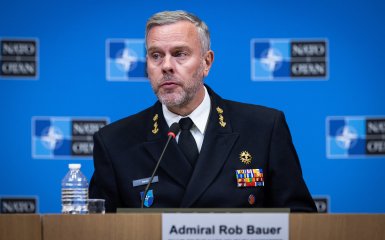According to the head of the NATO Military Committee, Admiral Rob Bauer, the era of peace and stability is over and very unpredictable times lie ahead.
Is the world on the brink of World War III?
Bauer emphasised that to counter global threats, and Western countries must begin to involve society and not limit themselves to the standard plans of the headquarters leadership.
We need public and private actors to change their mindset for an era in which everything was plannable, foreseeable, controllable and focused on efficiency to an era in which anything can happen at any time. An era in which we need to expect the unexpected, says the head of the NATO Defense Committee.
Bauer also called on Western countries' political leaders and military leadership to radically change their approaches to providing military aid to Ukraine.
This war has never been about any real security threat to Russia coming from either Ukraine or NATO,” Bauer added. “This war is about Russia fearing something much more powerful than any physical weapon on earth — democracy. If people in Ukraine can have democratic rights, then people in Russia will soon crave them too, stressed the high-ranking NATO military official.
Why did the US not do more for Ukraine's victory in the war
As noted in the Bloomberg article, during the two years since the beginning of the criminal war unleashed by the Russian Federation against Ukraine, the USA has done everything possible to help Ukraine achieve the most substantial positions possible.
President Joe Biden's strategy was certainly not optimal. But a fundamental change in the trajectory of the war would almost certainly require America to take higher risks of escalation in conditions where it had only a limited opportunity to predict the reaction of Russian President Vladimir Putin, the publication said.
It is noted that Ukraine gradually seized the initiative after the Russian assault failed in 2022.
As a result of the counteroffensive at the end of 2022, overwhelmed Russian troops were pushed back from Kharkiv and Kherson.
However, in 2023, the Armed Forces of Ukraine could not break through the better-prepared defensive lines in the east and south.
According to the journalists of the publication, critics of the Biden administration's policy are complaining that the US could have done more for Ukraine and more quickly.
Perhaps Ukraine could strike a more substantial blow earlier, carrying out a decisive counteroffensive when the Russian army was weakest.
Such an argument is fair, but it should not be exaggerated.
The supply of some vital types of weapons, such as 155 mm ammunition, was limited mainly by the availability of world supplies rather than American largesse.
It is unclear whether a broad counteroffensive could begin before the spring of 2023, when the Russians are already entrenched. As the Ukrainian army was exhausted by a combination of desperate defense and opportunistic offensive in 2022. When the counteroffensive did take place, its failure reflected the deep weakness of the Ukrainian army, including its inability to conduct complex, multi-stage operations, as well as the lack of aid, the publication said.
In March 2022, when the Russian army was vulnerable, Washington could give Putin an ultimatum, threatening military intervention by the West, led by the United States.
However, Biden rejected such ideas from the beginning, wary of the risk of an even greater confrontation with Russia, including nuclear escalation.
We now know that Putin had no interest in directly confronting the West or using nuclear weapons in Ukraine: he did not even when his army was defeated in late 2022. But it was more difficult to understand than to simply assert at the beginning of the conflict, when events were the most volatile and another US strategy could have the greatest effect, the authors of the material emphasise.




